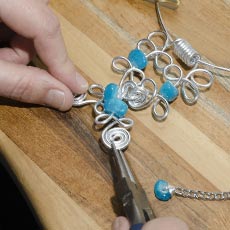HNC/HND Jewellery

The HNC/D Jewellery will prepare candidates to follow different career paths in the jewellery industry; such as manufacturing, design, self-employment or further study.
Use the tabs below to open each section individually. Alternatively you can show all the sections.
Who does this qualification suit
Entry
HNC Jewellery
As with all qualifications, entry is at the discretion of the centre. Examples of formal entry qualifications include: A National Certificate qualification or collection of National Units in Jewellery or equivalent qualification at SCQF level 5 or 6. If English is not your first language, English for Speakers of Other Languages at an appropriate level or IELTS at 5.5 is recommended.
If you have equivalent qualifications from this country or other countries, you may be accepted for entry, providing the competences can be identified and are appropriate. You may also be accepted if you have work experience in jewellery or another related industry, or evidence of experience or qualifications in a related area of Art and Design.
HND Jewellery
As with all qualifications, entry is at the discretion of the centre. Examples of formal entry qualifications include:
- A National Certificate qualification or collection of National Units in Jewellery or equivalent qualification at SCQF level 5 or 6.
- If English is not your first language, English for Speakers of Other Languages at an appropriate level or IELTS at 5.5 is recommended.
- If you have equivalent qualifications from this country or other countries, you may be accepted for entry, providing the competences can be identified and are appropriate. You may also be accepted if you have work experience in jewellery or another related industry, or evidence of experience or qualifications in a related area of Art and Design.
Progression and employment
HNC Jewellery
The HNC will qualify you for entry to jewellery manufacturing, design, or self-employment. The Employment would usually be at a level of basic skills within a workshop, though you would be able to progress to bench work with further training. On completion of the HNC you may progress onto the HND Jewellery. It may also allow you to progress into degree-level courses in a number of art schools in Scotland and England.
HND Jewellery
The HND will qualify you to work in jewellery manufacturing, design, or self-employment. You may be employed with a view to training as a workshop manager or as a trainee designer.
The HND may also allow you to progress into degree-level courses in a number of art schools in Scotland and England.
What you'll learn?
HNC Jewellery
The HNC Jewellery will prepare you to follow different career paths in the jewellery industry; such as manufacturing, design, self-employment or further study. It covers:
- Manufacturing Techniques: practical work involving the use of hand tools for the production of jewellery items.
- Design and Manufacture Jewellery: practical work taking into account design considerations as part of the process.
- Rub-over Setting Techniques: edge setting of cabochon and faceted gemstones.
- Claw Setting Technique: claw setting of round and shaped faceted gemstones.
- Lost Wax Casting: exploration of the production of jewellery from wax patterns using investment casting techniques.
You will also develop skills in designing and fabricating jewellery to a commercial standard, an understanding of the construction and production processes used in jewellery, and an understanding of the qualities of materials used in the jewellery industry. You will also develop your communication, study and research skills.
HND Jewellery
The Jewellery HND will prepare you to follow different career paths in the jewellery industry; such as manufacturing, design, self-employment or further study. It covers:
- Manufacturing Techniques: practical work involving the use of hand tools for the production of jewellery items.
- Design and Manufacture Jewellery: practical work taking into account design considerations as part of the process.
- Rub-over Setting Techniques: edge setting of cabochon and faceted gemstones.
- Claw Setting Technique: claw setting of round and shaped faceted gemstones.
- Lost Wax Casting: exploration of the production of jewellery from wax patterns using investment casting techniques.
- Jewellery: Graded Unit 1: Project based Unit which allows you to be graded A, B or C in response to a given brief.
- Advanced Manufacturing Techniques: the production of more technically demanding items of jewellery.
- Creative Projects for Artists and Designers: an opportunity for candidates to produce innovative design solutions for client presentation.
- Advanced Lost Wax Casting: use of the casting technique for replication of jewellery items through the use of rubber moulds.
- CAD: 3D Modelling: use of design/engineering software for the production of computer models of jewellery items.
You will also gain a range and depth of knowledge and skills of jewellery design and manufacture, a range of transferable business, management, communication and interpersonal skills, an understanding of advanced and experimental materials and processes used in jewellery, and the opportunity to acquire and enhance a range of specialised skills and knowledge in an area related to career aspirations.
Where can you take this course?
Arrangements Documents
Qualification Verification Summary Reports
Qualification Verification Summary Reports were formerly known as Internal Assessment Reports.